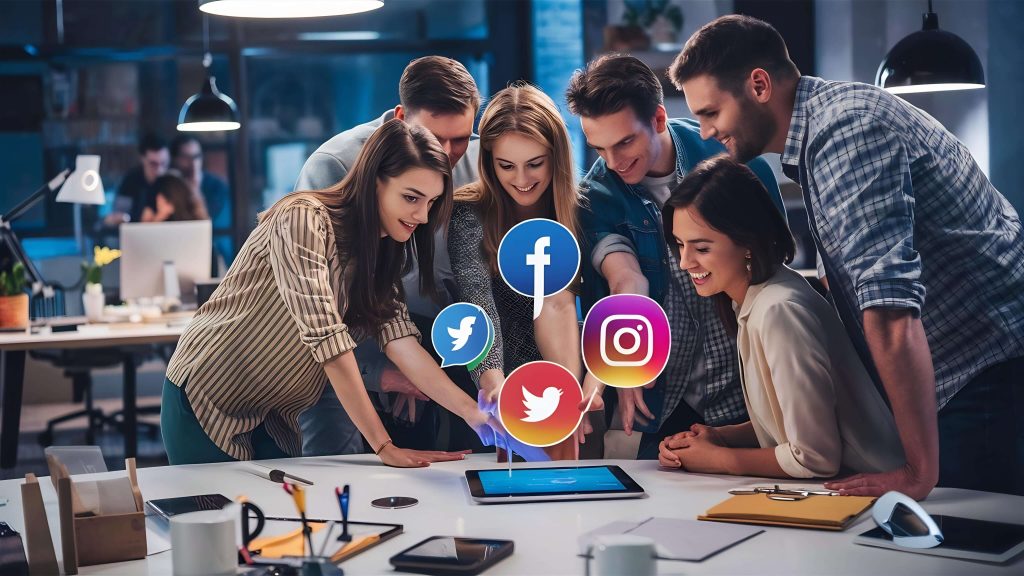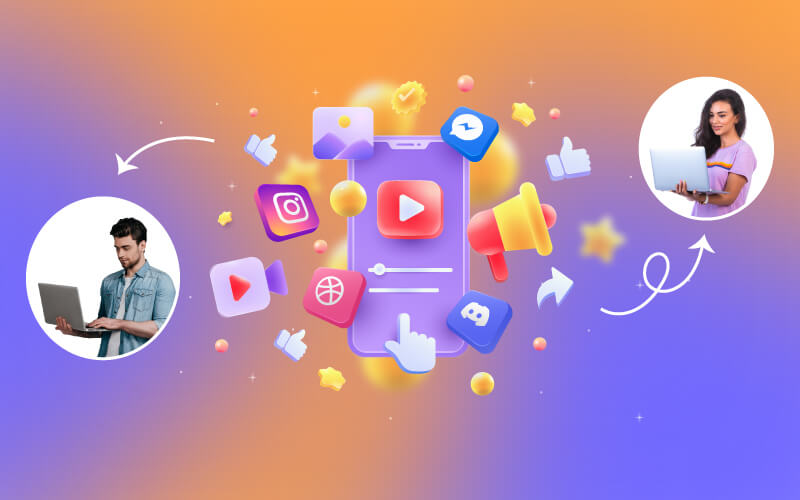Social media is one of the emerging and finest event marketing platforms in 2024. With the rise of digitalization, easy internet accessibility, and smartphones, social media has become everyone’s life’s part. As the saying goes; “the success of an event is not solely determined by its physical turnout but also by its virtual presence” It is indeed to leverage the power of social media event marketing. There are reasonable reasons to take this suggestion into account as diversified possibilities can be meant, whether to attract more registrations, engagement, improve event presence, take event content to remote audiences, to overall success. There is a lot that can be done with this. Here in this blog, we are going to explore social marketing for event strategies and innovative tactics on how to take your event promotion to the next level. So, without further ado, let’s get started;
Table of Contents
Importance of Social Marketing for Event: The Essential Term For Every Host
Every event host aspires to attract a wide range of attendees from their target audience and social media marketing for event planning is a crucial aspect. Firstly, it helps in promoting the event effectively while engaging the attendees before, during, and after the event. By utilizing the social media, host can get array of advantages like;
1. Increase event visibility and reach a wider audience
2. Build anticipation and excitement among attendees
3. Share important event details and updates
4. Encourage attendee engagement and participation
5. Monitor and analyze event performance

In today’s digital age, social media has become the most essential tool for every event host. Why? We all know the reasons how social media event marketing is helpful, even mentioned above. To be more specific, it gives a platform to connect with attendees, share valuable content, and create a memorable experience. Undoubtedly, by leveraging social marketing into their event strategy, any businesses to host can ensure a successful and engaging event.
Now, it’s high time to explore the crucial steps and considerations you need to take into account while event planning. So, no more ado’s, just the pointers you wanted to learn and implement to get the best ROI. Here is a breakdown of pointers based on event stages and other key components.
Social Media Pre-Event Marketing & Promotions: The Essential Stage!
Pre-event is the best time to do marketing as much as possible, not just over social or digital platforms. But if possible magazines to newspapers, billboards and other traditional methods can be helpful. Pre-event social media marketing can be most helpful as these can lead to greater registrations and ticketing.
1. Create Digital Event Page and Share Them Everywhere
There are many social platforms, events to be the least host can use Facebook, Instagram, or event X (formerly Twitter). The first step is to create a dedicated event page or profile. The second step is to craft compelling posts from video content to posters, with clear CTA (call-to-action) buttons.
Moreover, make sure to share the event details, registration pages to microsite links across all social channels. Also, utilize social media platforms, email newsletters, and other advertising channels. By using the appropriate #hashtags, trending music, short-video content (Reels), and tagging collaborators or sponsors can be helpful in expanding the reach.
2. Prepare in Advance
It’s all about the right time, right message and convincing tone that matters for effective event promotions. Start building anticipation by doing announcements about your event on social media prior. Launch the teasers, list of things attendee can experience, or if it’s like a conference like event do tell about the panel, speakers and exclusive perks to keep followers intrigued and eager. By offering information but in a strategic and timely manner can keep the attendees engaged and raise the possibilities that attendees do register.
3. Highlight the Expertise of Your Speakers
As pointed out, bring an imaginary experience or itinerary into lively, by creating buzz about the event sessions and booths. Post behind-the-scenes, or sneak peeks to engage and attract a wider audience. Furthermore, collaborate with industry influencers to position your event as a must-attend opportunity.
Content Creation and Engagement
With the ability to ignore your content in just a scroll, create such that users of social media pay attention to. This can be done by using the trending topics or by taking the below pointers into account.
4. Use Contests to Increase Word of Mouth
Engage your audience and spark excitement by hosting captivating contests as part of your social media event marketing. Encourage participants to share your event with their networks in exchange for a chance to win exclusive prizes or experiences. Align contest themes with your event’s focus to ensure relevance and maximize participation. Leverage user-generated content by showcasing entries and winners on your social media channels to amplify reach and foster community engagement.
5. Give Away Perks
By incentivizing the early event registrants, participants can be boosted. Do consider giving monetary benefits like. discounts, complimentary add-ons, or access to event recordings for those unable to attend in person. As the saying goes, ‘things that are seen are more likely to be sold’. So, showcase the success stories, post testimonials from past attendees. This is one of the best social media event marketing approaches that can be practiced. Overall, enticing new participants to join the experience.
6. Utilize Social Media Contests and Giveaways
Harness the viral potential of social media by running interactive contests and giveaways that resonate with your audience. From photo contests to caption challenges, leverage user-generated content to amplify event promotion and attract new followers. Ensure that prizes align with your event’s theme or offerings to enhance relevance and generate excitement among participants. Encourage staff involvement to amplify reach and humanize your brand, fostering authentic connections with your audience.
Visual Content and Storytelling
Visual memories are considerably the strongest memory compared to posts or messages. So, it is indeed to create impactful visual stories, posts, or videos that grab the attention. By using the past event feeds, create an appealing post and use it to create buzz.
7. Use Instagram and Facebook Stories
Elevate your social marketing for event efforts by utilizing the ephemeral nature of Instagram and Facebook Stories. To create a sense of urgency or exclusivity. This can be achieved by sharing behind-the-scenes glimpses, speaker highlights, or sneak peeks into event preparations. Furthermore, take advantage of interactive functionalities such as polls, quizzes, and countdown stickers to drive engagement and encourage participation.
8. Share and Discount Campaigns
Launch targeted campaigns that offer exclusive discounts or perks for attendees who register through specific social media channels or campaigns. Leverage visually compelling content and persuasive copy to entice followers and drive conversions. Incorporate interactive elements such as;
- Polls
- Quizzes
- Gamify the registration process
As this helps in enhancing user engagement. Make sure to keep track of the campaign performance closely. Based on the insights do improve your strategies to optimize overall results.
9. Utilize Gamification with Simple Polls
Engage your audience and spark conversation by incorporating simple polls into your social media event marketing content’s strategy. Pose thought-provoking questions related to your event theme or industry trends to encourage participation and foster community engagement. Leverage the gamification aspect of polls to incentivize sharing and increase event visibility among participants’ social networks. Monitor poll responses and use insights to tailor event content and messaging to better resonate with your audience’s preferences and interests.
Paid Media and Advertising
To earn more, it requires an investment first. The same context lies with the social marketing for events. If not much, do utilize the paid advertisement possibilities based on the market analysis to expand your reach.

10. Utilize Paid Media Ads
Invest in targeted paid advertising campaigns across all digital channels to amplify event visibility and reach. Utilize advanced targeting options to craft ads’ content based on the audience demographics, interests, and behaviors. Craft compelling ad copy and captivating visuals that highlight the unique value proposition of your event and entice users to take action. Monitor ad performance closely and optimize campaigns based on key metrics such as click-through rates, conversion rates, and return on investment (ROI).
11. Use Copy and Images to Increase Curiosity
Cut through the online noise and grab people’s interest by making interesting text and attractive pictures that make them curious and involved. Share short posts that give sneak peeks of what’s coming up or show behind-the-scenes stuff to get followers curious and wanting to know more. Use convincing words and storytelling tricks to make people feel something and get them interested in your event. Try out different ways of sharing information to keep your audience interested and wanting to see more.
Post-Event Engagement
Social media event marketing is not just limited to attracting more participants. As it has a wider range of benefits, that is it puts the event’s visibility, brand awareness and host reputation. With this sense, post-event engagement is very important.

12. Collect User-Generated Content
Utilize and repurpose the user-generated content (UGC) to extend the lifespan of your event and build brand credibility. Even during the event with the deployment of a social media wall, it can improve the engagement during the event. Encourage attendees to share their event experiences, photos, and testimonials on social media using event-specific hashtags or tagging your brand. Use this content and spread it over social media to showcase the authenticity and enthusiasm of your audience. Ultimately, this effort will lead to driving engagement and fostering a sense of community around your brand.
13. Share and Utilize Event Highlights
Keep the momentum going post-event by sharing key moments, highlights, and takeaways across your social media platforms. Create highlight reels, recap videos, or photo galleries that encapsulate the essence and energy of your event to keep attendees engaged and attract new followers. Leverage storytelling techniques to weave a compelling narrative around event highlights, showcasing memorable moments and impactful insights that resonate with your audience.
14. Follow Up with Attendees
Maintain a connection with event attendees by sending personalized follow-up messages expressing gratitude for their participation and support. Share event recaps, exclusive content, or special offers as a token of appreciation for their engagement and loyalty. This can be the best event attendee engagement ideas to be used in order to keep attendees informed about upcoming events, initiatives, or opportunities. By nurturing relationships with attendees post-event, you can cultivate brand advocates and ambassadors who will help amplify your future event promotion efforts.
15. Implementing Accessibility Features
Inclusive event marketing is paramount. Ensure that your event promotion materials and content are accessible to all individuals, including those with disabilities. Incorporate alt text for images, provide captioning for videos, and choose platforms that support accessibility features to reach a wider audience.
Top Considerations for Social Media Event Marketing
Leveraging Social Audio Platforms
Stay ahead of the competition by using trends in social media marketing, such as the rise of social audio platforms such as; Clubhouse and Twitter Spaces. Host live discussions, panel sessions, or interactive Q&A sessions using a live streaming platform or social channel feature. This will lead to high engagement in real-time, and foster meaningful connections around your event topic or industry.
Integrating Augmented Reality (AR) Experiences
Elevate attendee engagement and interaction by incorporating augmented reality (AR) experiences into your event marketing strategy. Create immersive AR filters, interactive demos, or virtual product showcases to captivate your audience and leave a lasting impression. Utilize AR technology to enhance event promotion and drive excitement leading up to the event.
Promoting Eco-Friendly Event Initiatives
Demonstrate your commitment to sustainability by integrating eco-friendly practices into your event marketing strategy. Highlight initiatives such as paperless ticketing, recycling programs, or carbon offsetting measures to appeal to environmentally-conscious attendees and differentiate your event from competitors. Leverage social media to showcase your green initiatives and inspire others to adopt sustainable practices.
Utilizing Predictive Analytics for Targeted Outreach
Harness the power of data analytics and predictive modeling to personalize event promotion efforts and drive targeted outreach. Analyze attendee demographics, behavior patterns, and preferences to tailor marketing messages, content recommendations, and promotional offers that resonate with your audience’s interests and motivations.
Building Online Communities and Forums
Foster ongoing engagement and dialogue with your audience by creating dedicated online communities or forums related to your event topic or industry. Encourage members to share insights, ask questions, and network with peers beyond the event date. Nurture community relationships through regular interaction, valuable content, and exclusive perks to cultivate a loyal and engaged audience base.
Summing Up
Undoubtedly, social media event marketing can elevate all your event promotion efforts to new heights. With strategic planning and engaging content creation to leverage innovative event technologies. This is agile in your approach, making social media marketing a nitty-gritty for maximizing event attendance, engagement, and overall success. Start implementing these strategies today to create memorable and impactful events that resonate with your audience both online and offline.
In-Person Events!
Simplified Event Planning and
Execution With Our Event Tech Suite





















